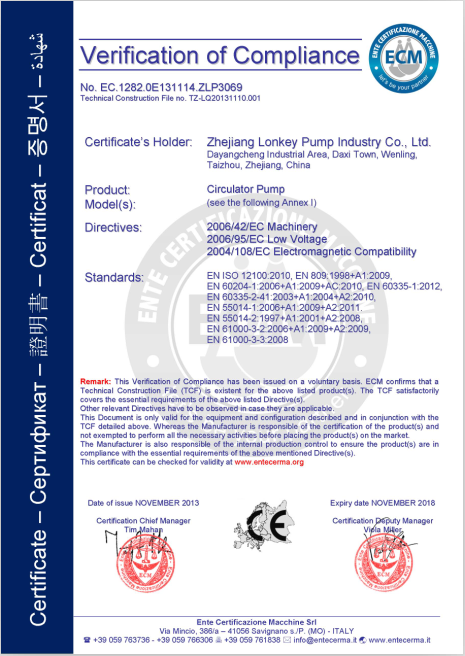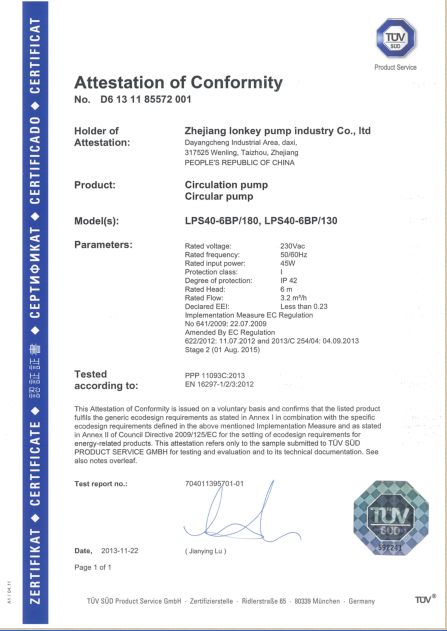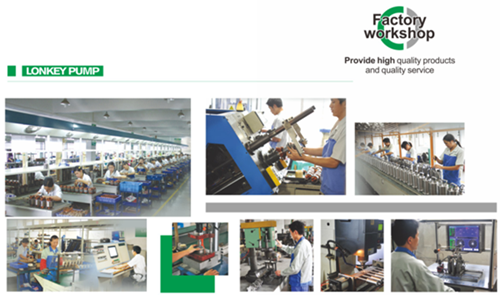Centrifugal Casting,Centrifugal Die Casting,Centrifugal Casting Products,Centrifugal Casting Company Tuopu Industry(Jiangsu) Co., Ltd. , https://www.tuopu-industry.com
Liquid temperature range: -10 - 110°C
Pipe size: G1.5", DN25mm
Port to port length: 130mm
Max. operating pressure: 10bar
Pressure stage, pipe connection: PN10
Max flow: 52l/min
Max head: 6m
Max input power: 45W
Model
Pipe Size
Power
Max-flow
Max-head
Port to Port
G.W
Â
Â
(W)
(l/min)
(m)
(mm)
(Kg)
LPS25-4BP
G1", DN20MM
22
46
4
130
2.6
LPS25-6BP
G1", DN20MM
45
52
6
130
2.6
LPS40-4BP
G1½", DN25MM
22
46
4
130/180
2.6
LPS40-6BP
G1½", DN25MM
45
52
6
130/180
2.6
LPS50-4BP
G2", DN32MM
22
46
4
180
2.6
LPS50-6BP
G2", DN32MM
45
52
6
180
2.6
Specifications
Circulator pump, wet rotor type, 304S.S.
No noise <45dB(A), no leakage, environment friendly, easy installation
Energy saving hot water circulation pump
This circulation pump is especially designed for heating systems and used to supply water and add pressure for city mansions, suburban villas, houses, and industrial equipment. It is ideal for cooling air-condition, boiler, and solar energy systems, providing hot water and maintaining a warm cycle.
Construction Material
Motor wire: Copper
Motor shell: Aluminum
Rotor can: Stainless Steel 304
Impeller: Ceramic
Pump body: Cast Iron
Shaft: SS
Bear: China
Company Profile
Zhejiang Lonkey Pump Industry Co., Ltd. is located in Wenling City of Zhejiang Province, known as the "Pump Town of China." Lonkey covers a total area of 28,000 square meters and has been a professional pump manufacturer for 17 years. The company features modernized standard factory plants, advanced production line equipment, computerized testing and controlling machines, vacuum lacquer dripping and drying equipment, and full-automatic product testing instruments.


a-Class Frequency Control Hot Water Circulator Submersible Water Pump
Model NO.: LPS25-6BP/180
Power: Electric
Start Up: Electric Pump
Type: Circulator Pump
Application: Submersible Pump, Clarified Water Pump, Sewage Pump, Slurry Pump, Oil Transfer Pump, Chemical Pump
Industry: Home Pump
Media: Water Pump
Performance: Automatic Pump
Theory: Circulator Pump
Pipe Size: G1 Dn20mm
Rated Power: 45W
Max-Flow: 52L/Min
Max-Head: 6m
Port to Port: 180mm
G.W: 2.8kg
Trademark: LONKEY
Specification: Standard
Origin: Taizhou, China
HS Code: 8413709990
Technical DataCentrifugal casting, also known as centrifugal casting, is a casting method that involves pouring molten metal into a rotating mold. Through this method, centrifugal force can be utilized to assist in filling the mold with metal and help remove porosity and impurities from the casting, thereby improving the density and quality of the final product. According to different application scenarios and technical characteristics, centrifugal casting can be roughly divided into the following categories:
Â
Â
Â
1. * * Horizontal centrifugal casting * *: In this type of centrifugal casting, the mold is placed horizontally. It is particularly suitable for producing long or tubular products, such as steel pipes, copper pipes, etc. Horizontal centrifugal casting can effectively control the uniformity of wall thickness and is very advantageous for producing large-diameter pipelines.
Â
Â
Â
2. * * Vertical centrifugal casting * *: Unlike the horizontal type, in the vertical centrifugal casting process, the mold is installed vertically. This method is suitable for manufacturing circular parts or products that require openings at both ends, such as certain types of valve bodies. Vertical setting makes the pouring process more convenient and also facilitates the removal of non-metallic inclusions.
Â
Â
Â
3. * * Tilted centrifugal casting * *: This is a method between horizontal and vertical, in which the mold is placed at a certain angle of inclination. The inclined centrifugal casting combines some advantages of the previous two, which is beneficial for forming products with specific shapes (such as conical shapes) and can improve the uniformity of material distribution to a certain extent.
Â
Â
Â
4. * * Semi continuous centrifugal casting * *: In this process, molten metal is continuously injected into a mold that rotates continuously but gradually moves away from the sprue position. This method is very suitable for large-scale production of products with the same cross-section but variable length, such as utility poles.
Â
Â
Â
5. * * Special purpose centrifugal casting * *: In addition to the common types mentioned above, there are also some centrifugal casting techniques developed for specific applications, such as high-temperature alloy centrifugal casting for producing aerospace components, composite material centrifugal casting for manufacturing complex internal structural parts, etc.
Â
Â
Â
Each centrifugal casting method has its unique advantages and scope of application. When selecting a specific method, factors such as the characteristics of the parts to be produced, cost-effectiveness, and production capacity need to be considered. I hope this information is helpful to you!